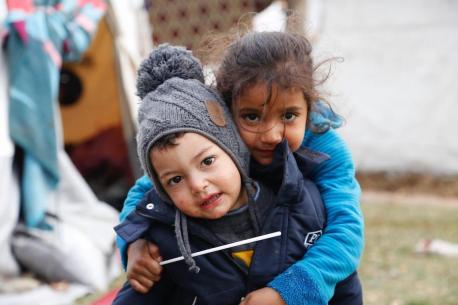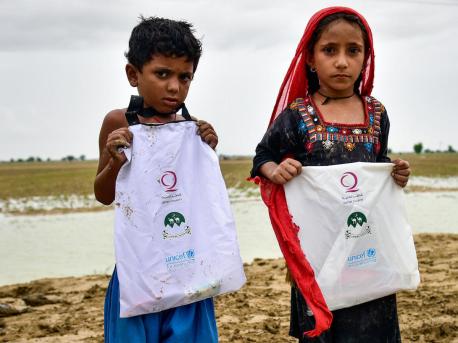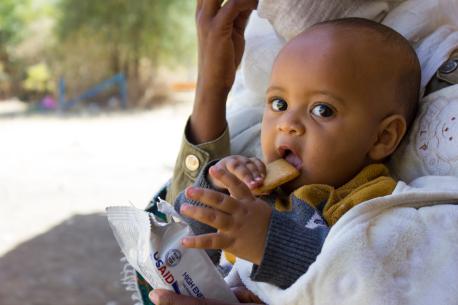A week in the flood zone: Dan Toole describes conditions in Pakistan
Daniel Toole is the UNICEF Regional Director for South Asia. He spent the last week surveying the humanitarian crisis in flooded Pakistan.
Day one: Full day of briefings in Islamabad. The floods span the country unlike anything in decades. Participated in United Nations Secretary-General debriefing. He was visibly shocked and said so - the scope of the destruction is massive.
Day two: Travelled to Peshawar, capital of Khyber-Pakhtunkhwa province - flooding along the expressway, crops are submerged, mud is everywhere, thousands of people are sleeping in makeshift tents on the median of the road - there is little food and water. UNICEF warehouse there was completely underwater - $1.2 million in emergency supplies lost! Spoke to a women who has lost everything except what she could carry. Few have been killed despite fast arriving water, but destruction is massive.
Day three: Back in Islamabad. Attended United Nations team meeting to discuss overall scope of the disaster. Initial appeal for help was based on an estimate of just over 3 million people in urgent need. Government of Pakistan now estimates that 20 million are affected, and that an area the size of Switzerland, Austria and Belgium combined is under water. Size of flooded area is growing daily, and more rains are due.
Day four: Sindh province. Took a helicopter flight over the area - there is water as far as we can see. Towns are flooded; electrical poles stand in deep, fast-flowing water. Almost 2 million acres are covered in water! Expert views of the situation were provided by staff of Sukkur Barrage office. The barrage, or dam, is one of largest in the world. It must hold or all irrigation works will be destroyed.
[[{"type":"media","view_mode":"media_large","fid":"378","attributes":{"class":"media-image","typeof":"foaf:Image","height":"385","width":"480","style":""}}]]Visited a camp for displaced people and sweat streamed down my face, back and body. It is so hot, and many (most) people are fasting for Ramadan - they don't even take water. How do they manage?
One moment of hope - school has started in one camp and about 180 children are sitting and learning on the first day. The class includes many small girls who are in school for the first time!
Day five: Muzaffargarh district, in southern Punjab. Road was completely flooded on the way here, but we got through. Trucks are backed up waiting. Our driver says the water level has gone down in recent days. The road is eroding - we hope it holds until the water recedes.
Spoke to a woman with five children who has lost everything. She fled the floods with her children, carrying no food, and only the clothes she was wearing. She and all her children are ill despite now being at a safe camp where cooked food is provided. Water supply is good in the camp and there seems to be enough food, but conditions in all camps aren't like this. These families are lucky.
Also visited a UNICEF 'child-friendly space' with games, toys and several caring adults to give children a welcome break from the grim reality and trauma of fleeing their homes.
UNICEF is responding quickly - nearly all staff from the Lahore office are here, plus many others. All are working to ensure clean water and sanitation and good nutrition. We are working with [the World Health Organization] and others to provide health services like immunizations, oral rehydration solutions for diarrhoea and basic drugs, and to ensure - as much as possible - protection for children.
Day six: Still in Muzaffargarh district, in southern Punjab. We're driving along a high embankment -- water on both sides of the embankment in some areas --other people still safe on one side. The thermostat on the car dashboard says its 40 degrees Celsius outside (over 100 degrees Fahrenheit). Can't imagine how people are surviving in this heat.
Some people have their livestock - precious assets they can sell later, if they can keep them alive. The mango trees are 3 feet under water and will probably die as will acres and acres of millet and cotton. So many livelihoods lost. How will this affect families, communities? People on the left of the embankment have lost everything. Those on the right of this embankment may actually benefit in the short-term as prices for agriculture goods soar. But, for how long will this income last?
I stopped to talk to a large family on the embankment. There are at 12-15 children of various ages huddled together. Their father has gone to their home this morning as he has done every day since the waters hit. He says his home is still partly standing and his livestock and some of his possessions are still o.k. He's afraid that someone may steal what little he has left so he stays on the embankment nearby. He has some water from a nearby well and has some wheat to eat (a lucky man). But the family's rice and cotton crop are under water - completely destroyed. All the seeds for the next planting are gone. The family has been helped by various philanthropic groups and his neighbors.
It's amazing to see how the Pakistani people are reaching out to each other across this flooded land. The government has rightly extended the school holidays as there are over 5,000 schools now providing shelter to the displaced. Across Pakistan more than 5,500 schools damaged or destroyed. This morning we passed three schools standing in 3 to 5 feet of water. There is a huge job ahead - massive reconstruction efforts are needed.
More than 20 % of health centers are damaged or flooded in an area as large as England or the state of Florida. The scale of this disaster and the geographic scope is hard to comprehend. From Swat to Karachi is 1,500 km --- and there is massive flooding the whole length.
We need to rapidly deploy a very strong disease surveillance system at the local level. With the scale and scope of this disaster, we will have to rely on the information from this surveillance system to quickly target disease outbreaks. Even with all UNICEF's partners and the government, there are just too few people and not enough capacity to respond without such a system in place.
Our staff are working day and night. They are far from their families during the holy month of Ramadan. And yet, they are doing this with excitement and commitment and without question. We must keep that spirit and spread it to thousands of others -- to reach those cut off and those most in need.
I can do all possible to raise funds, remove bureaucratic obstacles and get all the support urgently needed in the weeks and months ahead. The tasks are herculean and our support must be as well.


